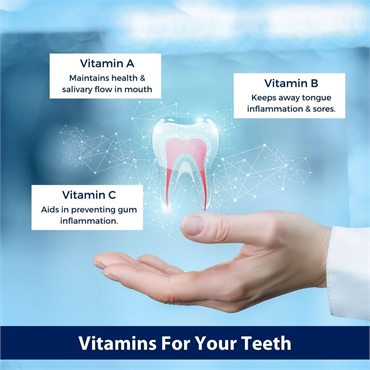How does nutrition affect your oral health
January 03, 2023

Nutrition affects your oral health in more ways than you can image. Adequate nutrition is obtained from a combination of vitamins, minerals, proteins, fats, carbohydrates. The intake of these essential complexes depends a lot on the manner in which the dietary source is consumed and the amount and frequency in which it is eaten. A lot of these factors also depend on cultural, religious and demographic factors.
Oral health's adequate maintenance requires proper consumption of essential dietary sources that help in various metabolic and defensive activities. All vitamins and minerals must be consumed at a certain recommended dietary allowance (RDA).
Vitamins and minerals play a crucial role in the synthesis of macro-components like proteins. Vitamins like Riboflavin, Niacin, Pyridoxine and Cyanocobalamin are immensely important in the synthesis of proteins, neurological functioning, tissue respiration and generation of energy sources for transport of cellular contents. The deficiency of these vitamins can lead to inflammatory lesions near the corner of the lips, ulcerations, painful and dry mouth, loss of taste, bleeding gums and delayed wound healing. There are different ways to preserve oral health with the help of systematic intake of these vitamins.
Vitamin C or ascorbic acid plays one of the most crucial roles in maintaining a healthy oral cavity. It helps in the formation of products responsible for wound healing and metabolism of amino acids. Its deficiency can cause swollen gums, destruction of tissues surrounding the tooth, increased risk of oral thrush and improper teeth formation.
Even though Vitamin A's major role is associated with normal eye functioning, it also plays an important role in maintaining the inner lining or epithelium of the oral cavity. The deficiency if retinol can also cause malformations of teeth, leaving them vulnerable to caries. Vitamin D plays an important role hard tissue formation and maintenance. If cholecalciferol is deficient then tissues supporting each tooth can weaken, thereby leaving the tooth at a risk of increased mobility. A below par consumption of Vitamin K can lead to delayed wound healing. Equipping your immune system with additional vitamins and minerals is crucial for oral health balance and can avoid many chronic and acute conditions in the oral cavity.
Minerals like calcium, phosphorous, sodium, manganese, potassium, iron, copper, zinc, molybdenum, chromium, copper and magnesium are instrumental in the maintenance of oral health. These minerals and vitamins are obtained from dietary sources like vegetables, fruits, poultry, milk, bread, sweets, legumes and cereals.
Dietary counselling is one of the most important services a dentist has to offer. Patients of any age group must be educated about the importance of consuming healthy diet. Apart from the contents in the diet, the consistency in which the diet is consumed should also be monitored. Slowly dissolving and sticky foods should be consumed less as they tend to make the mouth's environment acidic and vulnerable to caries. Moreover, in growing patients the introduction of semisolid to solid foods should be made as early as possible in order to tone the muscles involved in chewing and to strengthen the teeth against masticatory forces.
If the nutritional profile of a patient includes vitamin A, folic acid, Iron, riboflavin and Vitamin C, then he or she is at a much lower risk of getting caries. The detrimental effects of sugars must be explained to the patient. Decay causing microbes utilize these sugars for the secretion of their acidic contents that leaves the tooth surface weakened. Patients should be educated about food sugar substitutes like xylitol, that are rather beneficial for oral health.
Most commonly recommended dietary sources are green leafy vegetables, milk, eggs, fruits. A multivitamin you take each day is also an option for people that cannot get hold of variety of the up mentioned products. Foods containing high fibre content are cariostatic, that is, they inhibit the occurence of caries. The ones that catalyse the spread of caries are sugars, soft drinks, sweetened syrups, etc. In children, consumption of excess sugars is one of the reasons for early childhood caries (ECC).
Systemic conditions can be manifested directly as a result of poor nutritional status. Malnutrition is the most common outcome in these patients. Whatever food is consumed is converted into energy forms in four basic forms. Chemical energy for the synthesis of new compounds, mechanical energy for the functioning of muscle tissues, electrical energy for nervous tissues and thermal energy for regulation of body temperature.
Malnutrition can often trigger a cascade of detrimental events. The weakening of oral tissues due to inadequate diet can lead to a lesser intake of healthy food by the patient. This can leave him or her vulnerable to cardiovascular and gastrointestinal problems as the breakdown of food in the oral cavity is not adequate.
Diet and oral health are dependent on each other. A balanced diet maintains oral health and a better oral health can help in consumption of diet that is necessary for the body's functioning.

